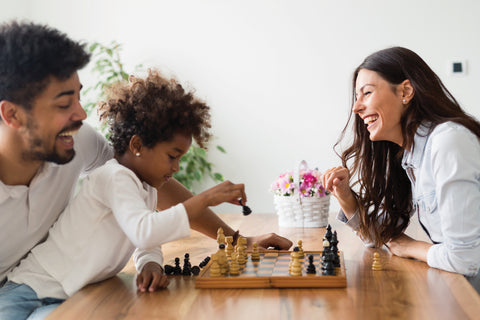You'll find at least a couple of hundred search results for why you should encourage your kids to play chess. Better grades. Improved problem-solving skills. Enhanced life skills. The list goes on.
But have you ever thought about why you should play with them?
If you're a rookie like me, there's probably quite a big chance of you losing to your seven-year-old. So why dare challenge your little ones to a game? Here are the top 5 reasons why you should be playing chess with your kids.

1. Improve your relationship with your kids
While children need time to play alone and with other children, playing with their parents is also important. Sharing laughter and fun can foster empathy, compassion, trust and intimacy with others. Play is a powerful catalyst for positive socialisation. Through play, children learn how to "play nicely" with others and socialise in groups. As adults, you can continue to use play to break down barriers and improve your relationships with others.
2. Improve brain function and prevent Alzheimer's
Because the brain works like a muscle, it needs exercise like any bicep or quad to be healthy and ward off injury. A recent study featured in The New England Journal of Medicine found that people over 75 who engage in brain-stretching activities, like chess, are less likely to develop dementia than their non-board-game-playing peers. Just like an unexercised muscle loses strength, unused brain tissue leads to a loss of brain power.
3. Blow off some steam
Play is fun and can trigger the release of endorphins, the body’s natural feel-good chemicals. Endorphins promote an overall sense of well-being, relieving stress and can even temporarily relieve pain.
4. Improve recovery from a stroke or disability
Chess develops fine motor skills in individuals who have a disability or have suffered a stroke or other physically debilitating accident. This form of rehabilitation requires the motion of chess pieces in different directions (forward, backward, diagonally forward motion, diagonally backward motion), which can help develop and fine-tune a patient’s motor skills, while the mental effort required to play the game can improve cognitive and communication skills. Playing can also stimulate deep concentration and calm, helping to centre and relax patients who are experiencing different degrees of anxiety.
5. Build self-confidence
No matter what your age, playing chess will build up your self-esteem. When you play, you’re on your own, and if you lose, you have to take stock and analyse just where you went wrong. Playing and analysing why you lost or won a game increases the level of mental strength and self-confidence that you bring to the world beyond the chessboard.
So you see, it isn't just good for them. It's good for you as well. Even it means losing a couple of games to your seven-year-old.


